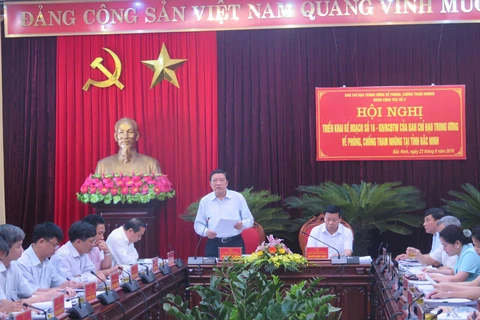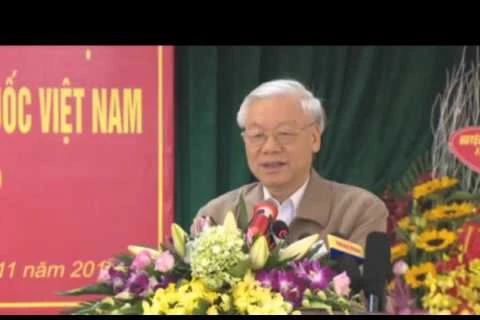Bac Ninh (VNA) – The northern province of Bac Ninh will make most of its potential and advantages as well as overcome difficulties and challenges to continue creating strong breakthroughs in social-economic development and become a centrally-governed city by the 2020s.
Nguyen Nhan Chien, Secretary of the Party Committee and Chairman of the People’s Committee of Bac Ninh, made the remarks at the 20th anniversary of the province’s re-establishment on January 3.
The province will also strive for becoming one of the leading localities in building an e-government and developing a smart city, Chien said.
Speaking at the event, To Lam, Minister of Public Security, recognised and praised important achievements the province’s Party Committee and its people have achieved in the past 20 years.
Lam recommended Bac Ninh to optimize its potential and advantages for sustainable development.
The province needs to review the planning of sectors in connection with the master plan for social-economic development, the overall urban planning and the modified Hanoi Capital region planning.
He also urged the province to apply information technology in urban management, restructuring economy, reforming growth model, effectively managing and using resources, and solving environmental pollution, especially at industrial clusters and craft villages.
He also recommended the province to boost activities in attracting investment and developing support industry and applying high technology into agriculture and implementing the national goal programme on building new rural areas.
Bac Ninh province was re-established on January 1, 1997. After 20 years, the province has transformed from an agricultural province into an industrial one with the economic growth rate of 15.1 percent on average during the 1997-2016 period.
The province’s 16 concentrated industrial zones have attracted 935 projects with a total registered capital of 12.3 billion USD, including many multinational corporations like Samsung, Microsoft, Canon, and Pepsico.
The province’s 2016 industrial production value is estimated at 766 trillion VND (34.5 billion USD), a 1,200-fold rise over that of 1997.
The province has 58 communes and two districts qualified as new rural localities. Healthcare and education have been improved significantly.
The province has two UNESCO-recognised intangible cultural heritage – Quan Ho (love duets) and Ca Tru (ceremonial song). It also has four special national relic sites, five groups of artifacts recognised as national treasures, one ritual, one folk game, eight festivals and villages honored as national intangible cultural heritages.-VNA
Nguyen Nhan Chien, Secretary of the Party Committee and Chairman of the People’s Committee of Bac Ninh, made the remarks at the 20th anniversary of the province’s re-establishment on January 3.
The province will also strive for becoming one of the leading localities in building an e-government and developing a smart city, Chien said.
Speaking at the event, To Lam, Minister of Public Security, recognised and praised important achievements the province’s Party Committee and its people have achieved in the past 20 years.
Lam recommended Bac Ninh to optimize its potential and advantages for sustainable development.
The province needs to review the planning of sectors in connection with the master plan for social-economic development, the overall urban planning and the modified Hanoi Capital region planning.
He also urged the province to apply information technology in urban management, restructuring economy, reforming growth model, effectively managing and using resources, and solving environmental pollution, especially at industrial clusters and craft villages.
He also recommended the province to boost activities in attracting investment and developing support industry and applying high technology into agriculture and implementing the national goal programme on building new rural areas.
Bac Ninh province was re-established on January 1, 1997. After 20 years, the province has transformed from an agricultural province into an industrial one with the economic growth rate of 15.1 percent on average during the 1997-2016 period.
The province’s 16 concentrated industrial zones have attracted 935 projects with a total registered capital of 12.3 billion USD, including many multinational corporations like Samsung, Microsoft, Canon, and Pepsico.
The province’s 2016 industrial production value is estimated at 766 trillion VND (34.5 billion USD), a 1,200-fold rise over that of 1997.
The province has 58 communes and two districts qualified as new rural localities. Healthcare and education have been improved significantly.
The province has two UNESCO-recognised intangible cultural heritage – Quan Ho (love duets) and Ca Tru (ceremonial song). It also has four special national relic sites, five groups of artifacts recognised as national treasures, one ritual, one folk game, eight festivals and villages honored as national intangible cultural heritages.-VNA
VNA
























